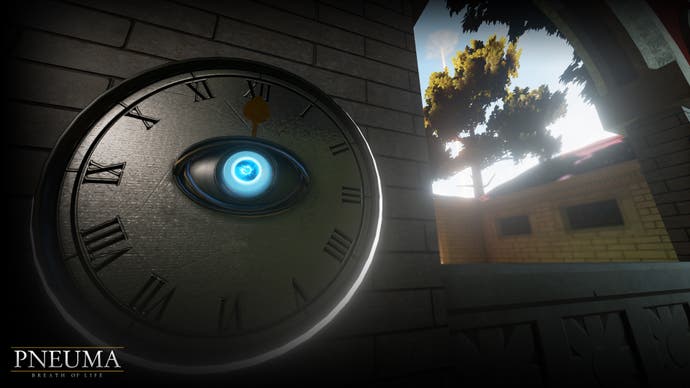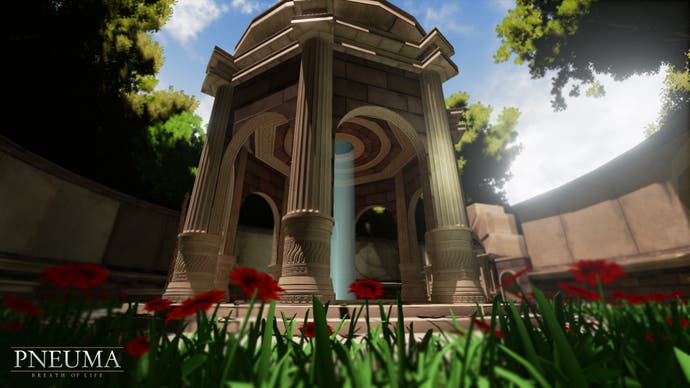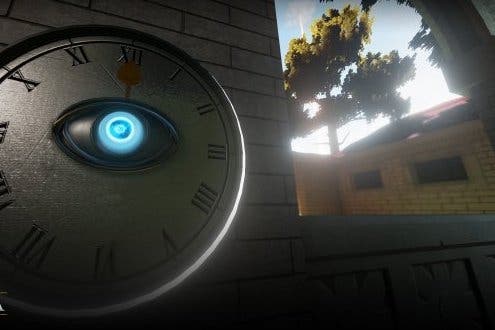Pneuma: Breath of Life review
Seeing is believing.
Eurogamer has dropped review scores and replaced them with a new recommendation system. Read the editor's blog to find out more.
Deco Digital's impressive first-person puzzler Pneuma: Breath of Life is not a religious game - that's to say, it's not a game that espouses a particular faith, though it makes play of ideas that may be familiar from scripture. Brought superbly to life using Unreal Engine 4 (and with support for Oculus Rift, to put the cherry on the cake), its sumptuous Greco-Roman halls, courtyards and towers comprise a sort of demilitarised zone for believers and non-believers, reaching back to traditions of the sacred in art that are unlikely to strike anybody now living as blasphemous or preachy. And yet, it's a game that often makes you feel like you're under divine surveillance, a trespasser on holy ground.
It's in the way the world sits uncannily between thought experiment and habitable landscape - an impossible marble labyrinth that is strewn with props like hand brushes, urns and torches which imply the presence of other beings, not long absent. It's in the fact that there is birdsong but there are no birds. Most of all, it's in the curious metallic stencils of eyes that serve as Pneuma's key puzzle component, eyes that catch yours as you round corners or study the background in an oil painting. There is a quiet horror to these encounters which makes a game that could have seemed dustily abstract feel pressing and powerful.
The dread of being monitored from on high is reinforced by the cheery audacity of Pneuma himself, a creature who is as new to this world as you are but rather more brazen about his significance within it. There are plenty of games that cast the player's character as the centre of the universe - by virtue of firepower, if nothing else - but Breath of Life is the first I've played in which the main character outright declares this to be the case, straight off the bat, arguing that since the world is what he perceives it to be, it follows that he is the world's creator.

Appropriately, the most meaningful action in Pneuma is simply to see. Many of the world's objects - doors, panels, folding bridges - change when they're observed. There are a few lever and button-based conundrums to worry about, plus the odd gentle jumping section, but the majority of puzzles are solved by looking at things - or, more vexingly, not looking at them. A relatively simple example would be a door that only opens when you keep one or more eye symbols in view. Other enigmas make use of tricks of perspective, or of your motion relative to whatever it is that you're staring at, or the movement of light and shadow. It's a pleasing throng of concepts, some unique to this game.
There are tips aplenty to glean from Pneuma's internal monologue, a plot-length babble that doesn't so much break the fourth wall as sit commandingly astride it, hands on hips. Initially the tone is whimsical, as Pneuma unconsciously subjects the design of the game that surrounds him to light-hearted interrogation, perceiving its structures through the prisms of his god complex. "Lead me, path!" he shouts early on, in what seems a cheeky reproof to critical hand-wringing over games (like this one) in which all you really do is head from A to B. "Lead me to my destination!" Later, however, a note of doubt sets in, as Pneuma confronts doors that won't open on command and libraries full of books he must have authored, but can't remember writing.
Rather brilliantly, some of the character's asides use the involutions of game design as a means of illustrating certain well-thumbed existential dilemmas. When Pneuma pompously notes that "as I move forward, the world approaches!", the initial reaction is one of amusement, like when a child utters something palpably untrue which nonetheless makes a certain twisted sense if you think about the key terms out of context.
The script's leaps of deduction are also the basis for some great jokes, like when Pneuma wonders if, given that he can move platforms by looking at them, he can also move them to tears. In the playfulness of its smarts, the writing calls to mind Douglas Adams's Hitchhiker's Guide to the Galaxy - fans of a certain short-lived whale may be tickled by the offhand way Pneuma tumbles through chains of thought that have preoccupied philosophers for centuries.

Alas, the script isn't always this sharp - as in Ken Levine's work, its self-awareness can be obnoxious - and nor are the puzzles. Some are too bookish, treatments on venerable debates about perception and reality that don't make for enjoyable brain-ticklers. Other, more generic specimens just feel a bit clumsy in the context of the elegant binary reasoning that informs the sight puzzles. Having to tilt levers a certain amount in order to raise a series of steps strikes me as the worst. Conversely, I was delighted to discover halfway through that the element of sound, hitherto dismissed, could be as important a cue as the telltale pattern above a door.
More broadly, Breath of Life's flaw is that it doesn't evolve. While the puzzles do chain together to some degree, there isn't the same sinuous elaboration of basic problems into complex, multi-stage enigmas that characterises the best the genre has to offer. You get the sense that too much time has been spent deriving blueprints from classical texts and picking at each one by itself, rather than thinking about how they're all connected, and the consequence is that you don't look back and marvel at how far your methods have advanced, as in the likes of Portal.
You will, however, look back with a certain awe, thanks to an ending that again compares to Ken Levine's work in how it makes the very structure of the game complicit in the performance of a revelation. As you'd expect, it's hard to talk about this without spoiling the surprise, and interpretations will vary in any case. Suffice to say that for me, at least, its achievement is that it leaves you to decide which is worse: the absolute certainty that we are all being watched and judged by an unseen, terrible power, or the absolute certainty that we aren't.
These are intriguing times for gods in games. If the collapse of Peter Molyneux's Project Godus is an apocalyptic turn of events for the genre Populous gave life to, a new breed of "god sim" is on the march - one that seeks not to portray a god but to mechanically enact the uncertainties that make us wonder if deities exist. Breath of Life is a remarkable contribution to this highly select field. Its strength is that it looks at the same predicaments as Portal and Bioshock from a compelling angle, unburdened by lore, but it doesn't quite have the spark to be breathtaking.

